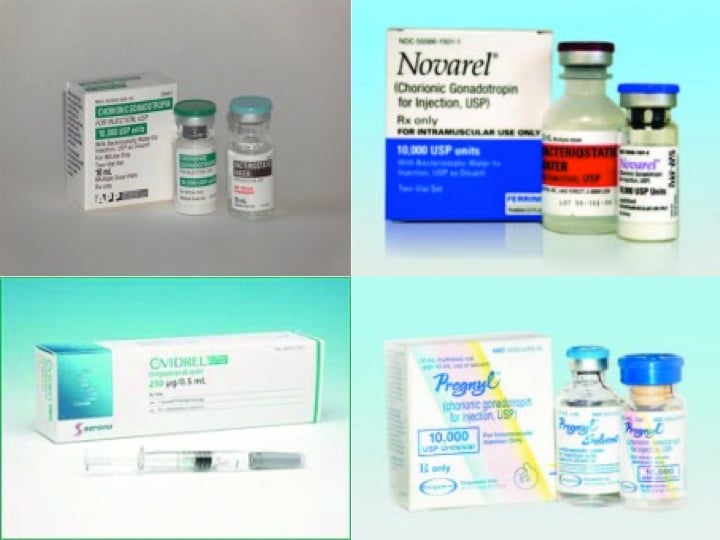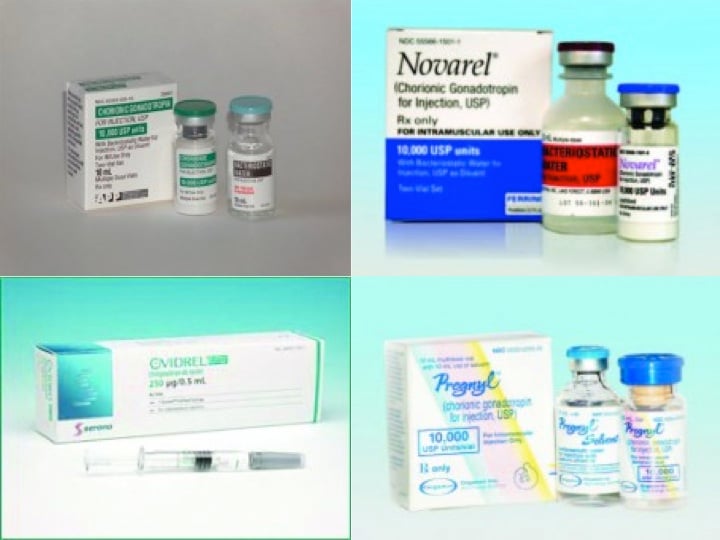

Pop? Trigger? You have probably heard us use these terms in the office before and maybe you’ve wondered what they meant. “Triggering” or “popping” a patient refers to using the hCG medication. hCG stands for human chorionic gonadotropin. It is the “pregnancy” hormone and is responsible for maintaining the corpus luteum and causes the increase in progesterone and estradiol in the first trimester of pregnancy.
In a normal menstrual cycle, ovulation is triggered by a mid-cycle luteinizing hormone (LH) surge. LH has a short half-life and the dose of LH required to trigger ovulation in a treatment cycle will be quite high. Although recombinant LH is available, it is seldom used to trigger ovulation. hCG has a structure similar to LH and has a longer half-life and is more effective for inducing ovulation. It is therefore routinely used as a surrogate LH surge.
In ovulation induction cycles, we treat patients with fertility pills (clomiphene citrate, letrazole, tamoxifen) or fertility injections (follicle stimulating hormone (FSH) or human menopausal gonadotropin (hMG)). Cycle monitoring is often done with urinary ovulation kits or serial blood tests and ultrasounds. When follicle size and/or blood tests indicate that the eggs are “ready”, the hCG “trigger” shot is given. Ovulation will occur sometime in the subsequent 36 – 39 hours. This is when you will be instructed to have intercourse or intrauterine inseminations.
In in vitro fertilization (IVF) cycles, taking your hCG shot at the specific mandated time is critical. hCG has several functions 1) it is an essential step for final egg maturation. 2) as a part of maturation, the eggs float freely in the follicular fluid and are available for retrieval. If you do not take the hCG shot we will be able to retrieve few (if any) eggs and they will probably be immature. 3) Your retrieval is usually timed 36 hours after the hCG trigger shot. That is generally when we will get the maximum number of mature eggs and you will not have ovulated.
There are 2 different types of hCG -- urinary hCG (uhCG; Pregnyl, Novarel) and recombinant hCG (rhCG; Ovidrel). uhCG is produced by the placenta and extracted from the urine of pregnant women. It has been used as the primary type of HCG for the last 30 years and is a cheaper alternative than the rhCG. The rhCG is derived from the ovarian cells of hamsters. Both types are then processed in a lab to put it into a concentrated, injectable form. Both forms of the hCG are equally effective.
hCG is typically given as a subcutaneous or intramuscular injection. The most common dose is 10,000 iu but the dose can range from 3000-20,000 iu. Side effects of the hCG injection will mimic pregnancy. Most commonly patients will complain of mild nausea, headaches, fatigue, breast soreness, irritability, abdominal bloating or uterine cramps. Local injection site irritation has also been noted more commonly with the uhCG. Your chance of having multiples will also increase if you have multiple follicles because the hCG injection will cause you to ovulate from them with the possibility of all those released eggs fertilizing. hCG can stay in your system for 10-14 days after the initial injection and since it mimics LH it can give you a false positive on a home pregnancy test so as tempting as it may be, we ask our patients to not take a home test earlier than the date we give you for the blood test.
If you have experienced trouble conceiving and live in the greater Chicagoland area, please contact InVia fertility to schedule an appointment and let us help you achieve your dreams!

Katie Coss graduated from Northern Illinois University in 2002 with her Bachelor of Science in Nursing degree. She started working at InVia in Sept 2011 after almost 9 years of working as a Labor and Delivery RN. She nad her husband conceived their second son through IVF and she always remembers thinking she wanted to take care of other people going through the same thing.
Subscribe to our weekly blog digest

Entire Website © 2003 - 2020
Karande and Associates d/b/a InVia
Fertility Specialists

Comments